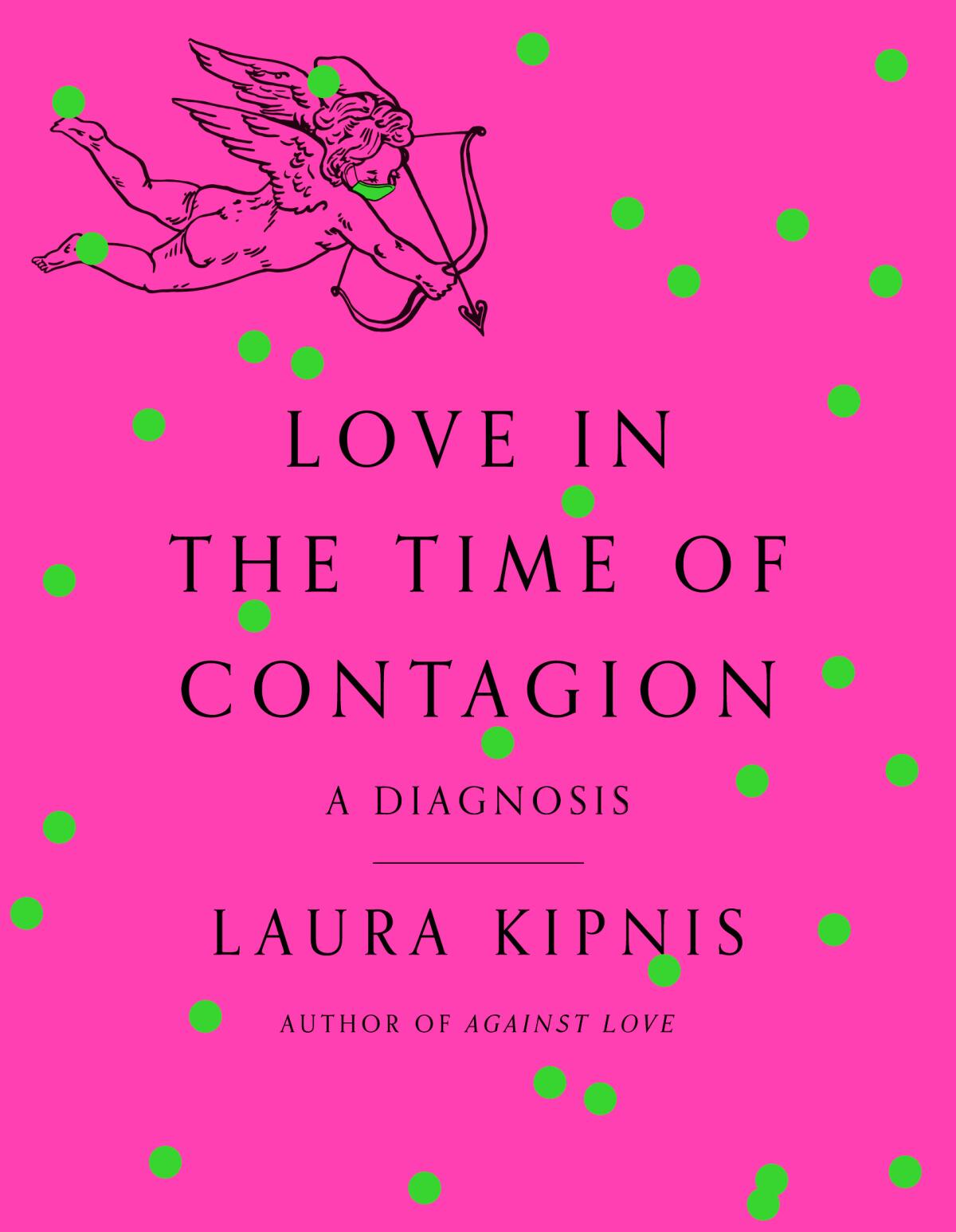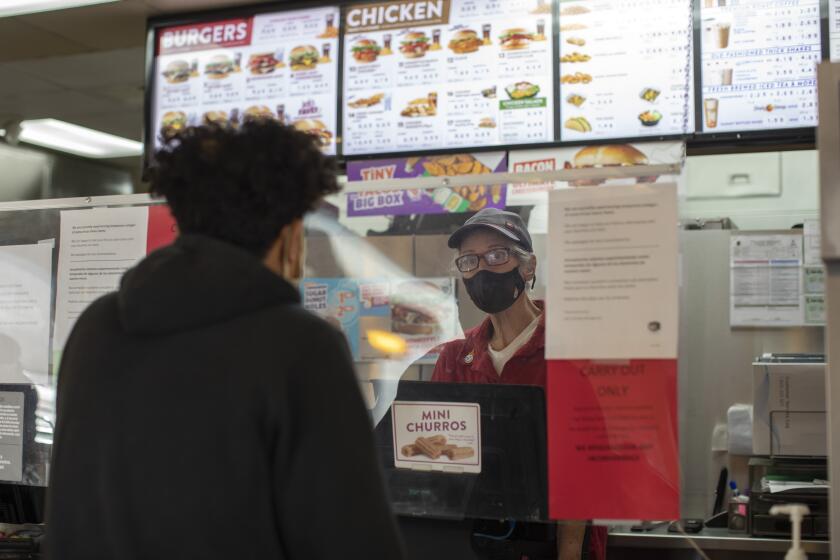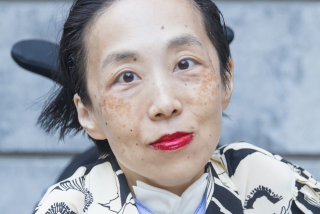#MeToo dissident Laura Kipnis grapples with the pandemic

- Share via
On the Shelf
Love in the Time of Contagion: A Diagnosis
By Laura Kipnis
Pantheon: 224 pages, $26
If you buy books linked on our site, The Times may earn a commission from Bookshop.org, whose fees support independent bookstores.
It is unsurprising that the strongest chapter of Laura Kipnis’ new book, “Love in the Time of Contagion,” is “Vile Bodies: Heterosexuality and Its Discontents.”
In the last 10 years, the critic has written on the repercussions of #MeToo and “feminism’s carceral turn.” After her article on the accusations of sexual harassment lodged against Northwestern professor Peter Ludlow appeared in the Chronicle of Higher Education, Kipnis was the subject of a Title IX investigation. She was exonerated, but when her last book, “Unwanted Advances: Sexual Paranoia Comes to Campus,” was published in 2017, one of Ludlow’s accusers sued Kipnis and her publisher, Harper Collins.
It makes perfect sense that Kipnis would want to weigh in on #MeToo, but what does #MeToo have to do with the COVID-19 pandemic? The two do often attack the same host: Harvey Weinstein was convicted of rape and sexual assault and contracted COVID in prison in March 2020, while Donald Trump, who has also been accused by dozens of women of sexual harassment and assault, assured the country that the virus was no big deal. (Then-President Trump contracted COVID in October 2020.)
It’s been said, Kipnis relates, “that a leader’s body signifies the dilemmas of a nation.” How terrifying! For Kipnis, though, it’s not just about gross men but rather our disgust with heterosexuality itself. “The fact is,” Kipnis writes, “that women finding men disgusting is a modern achievement.”
Amia Srinivasan’s provocative new work, ‘The Right to Sex,’ makes the case for reinventing class-conscious feminism. Much of the time, she’s dead on
“Which makes me wonder,” she continues, “how much women’s increasing financial independence, including the option to live life without a man or choose queerness in any of its flavors, has contributed to men seeming so much more encroaching and disgusting these days, including their jokes and their mild overtures? To put the question in more sweeping terms, can heterosexuality survive gender parity?”
I appreciate the provocation. There is something exhilarating about the idea that women no longer have to tolerate powerful men if they are ugly. But shouldn’t the goal be for men to cede power over women no matter what they look like? Also: “choose” queerness?

There is much to unpack in the “Vile Bodies” chapter: a discussion of BDE; the downfalls of Anthony Weiner and Jeffrey Toobin; the policing of out-of-office behavior (“is the treatment of the workforce more humane when there’s no ‘off-the-clock’?”); Asia Argento; and “sexually liminal” behaviors like “innuendos, come-ons, banter, ‘stolen kisses.’”
“For many women,” Kipnis writes, “especially of the heterosexual persuasion, these in-between zones are what makes life worth living.”
That may be so for Kipnis and some of her friends, but to say for many women “especially of the heterosexual persuasion” — reader, this writer spit out her coffee.
The passage is a good example of where Kipnis can take a step forward and another back: An indictment of capitalism’s totalizing intrusion into our lives quickly followed by the assertion that a similar encroachment, in the form of unprovoked sexual intrusions, simply “makes life worth living.”
The people who are adapting best to working from home are the ones who have been juggling demands all along: parents.
The book’s other chapters — “Love and Extinction”; “Love on the Rocks,” on dependency in relationships and alcohol; and “Love and Chaos,” on the difference between Kipnis’ experiences and those of her student Zelda, “queer, Black, and very online” — feel hollow, especially in comparison to the verve with which Kipnis attacks the giant wagging finger over sexual misbehavior.
Entertaining the intent of the majority of this book, which is to investigate how the pandemic has affected our relationships, is a big ask, especially when Kipnis excludes the experience of parents, caregivers and those who have suffered enormous losses: the loss of agency, of loved ones, of their health. Although she “burglarize[s] Marx” — “we don’t make love under circumstances we choose, we make love under the circumstances we inherit” — her book misses the opportunity to speak on how a lack of sexual desire might reflect the realities the pandemic has laid bare: a labor and care crisis of apocalyptic proportions.
“If you’re reading this you recently survived a massive worldwide extinction event, congratulations,” the book begins. “On another but not entirely unrelated subject, how’s your love life?” Ultimately, I’m not convinced that being in isolation (partnered or not) has had much of an effect on our understanding of love. It’s Kipnis’ questions about monogamy, and in particular heterosexuality, that seem worth asking. They existed before the pandemic — and during. Here’s hoping that by the end of all this, we’re not too exhausted to keep asking them.
“Can we have heterosexuality without heteronormativity?” Kipnis asks. I think the answer is a resounding yes, especially if we ever hope to dismantle the cruel economic structures that have reasserted themselves during a generational health emergency, forcing women to quit their careers and the working class to sacrifice its safety.
Kipnis closes the book with a collection of anecdotes she read online during the pandemic: the miserable, bored and the lovelorn airing their complaints in the time of contagion. “Our relationship requires a social village more than I realized,” one person wrote. “One person isn’t ‘enough’ for me.” Wondering what might be enough, or at least closer to it — asking ourselves, as Kipnis writes, “does it feel good?” — is the right place to start.
Short-staffed employers are pressuring workers to stay on the job while feeling sick or with COVID-19. CDC guidance and testing disparities aren’t helping.
Ferri’s most recent book is “Silent Cities: New York.”
More to Read
Sign up for our Book Club newsletter
Get the latest news, events and more from the Los Angeles Times Book Club, and help us get L.A. reading and talking.
You may occasionally receive promotional content from the Los Angeles Times.








